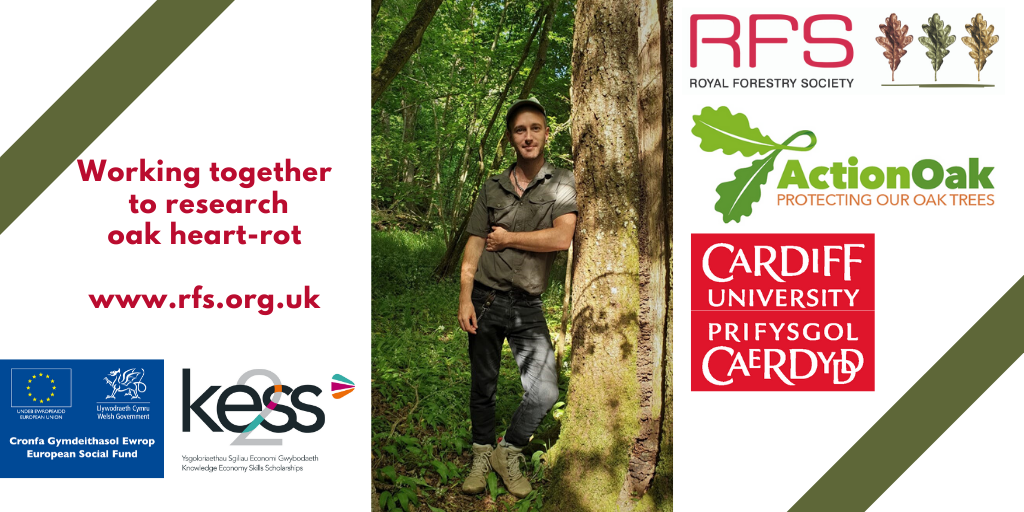
Richard Wright: Embarking on three-year ground-breaking study into oak heart rot
Research has begun this summer to throw new light into a little understood condition in older oak trees – heart-rot. Mycologist Richard Wright has started a three and a half year KESS 2 PhD research project under the Action Oak initiative, which is supported by European Social Funds (ESF), supervised by Professor Lynne Boddy at Cardiff University and supported by the Royal Forestry Society (RFS).
Heart-rot is common in oak trees aged 200 years and over and almost universal by the time trees reach 400 years old, but how and why it occurs is a subject which has only just begun to be explored.
Richard says: “Despite its name, heart-rot can be highly beneficial for some tree species. For oaks it can help them adapt and reach great ages by releasing nutrients for continued growth and adjustments in the tree’s structure, but heart rot is also at the centre of the richness of the forest ecology. Without it many birds and mammals would not be able to find the holes and conditions to nest, and the complex fungal food chain that supports a huge diversity of insects that so many rely on as a food source would be cut short.
“We do know the common causal agents of heart-rot and their processes, we will be expanding on this knowledge and looking at the interactions, succession, and diversity of these decay communities, in particular the spatial relationships and territories of heart-rot fungi in 3D. To be involved in this sort of pioneering fungal ecology is an aspect of mycology that I find really exciting – looking into the hearts of trees and understanding the essential roles fungi play in forest ecosystems.”
Oak heart-rot is often not visible to the human eye for many decades. Richard’s field work will look at oak trees primarily aged 150 years and over in Wales and he will be collaborating with a colleague carrying out similar research in England. He hopes to be taking samples this summer (subject to Covid-19 restrictions) before beginning analysis, DNA sequencing and developing a 3D model of heart rot progression within a trunk.
Project supervisor Professor Lynne Boddy of Cardiff Biosciences says: “We are delighted to be working with Richard Wright in this important research and to have the support of RFS members. Heart-rot is a natural process and provides habitat for fungi, including the rare oak polypore Buglossoprus quercinus, rare saproxylic invertebrates and some vertebrates. We are hoping not only to understand the interactions that lead to heart-rot, but to understand its progression. Research into beech heart-rot a few years ago revealed fungal decay communities we would never have guessed looking at the fungal fruit bodies on the trunk, and it may well be that we will find a few surprises along the way.”
Chris Jones Chair of the South Wales Division, says: “ We look forward to introducing Richard to our members in Wales who can support him. They manage woodlands for a range of reasons but many take the greatest pleasure from their older broadleaved woods and research like this that enhances our knowledge of the overall woodland environment is extremely valuable. The research will also provide important evidence on rot in oak that has the potential to be used to inform tree safety management for woodland owners.”
Richard Wright has been delivering educational courses and field studies in mycology for the past ten years and been a researcher at the Royal Botanical Gardens at Kew where he continues to be involved in the Plant and Fungi Tree of Life project.
About the collaborative partners:
The Royal Forestry Society
- The Royal Forestry Society (RFS) is the largest and longest established educational charity promoting the wise management of trees and woods in England, Wales and Northern Ireland.
- The RFS aims to inspire passion and excellence in woodland management through education and knowledge-sharing.
- The RFS believes bringing neglected woods back into management and sharing knowledge on how to manage woods to a high standard is vital to the long-term health of our woods and trees. Their policies identify what is required to ensure our woods deliver their full economic, environmental and public benefits.
- RFS research publications and reports can be found at https://www.rfs.org.uk/about/publications/
- For information go to rfs.org.uk. Twitter: @royal_forestry, Facebook: Royal Forestry Society – RFS
Cardiff University School of Biosciences
- The Cardiff University School of Biosciences has an excellent reputation for research: 84% of our submitted research classed as “internationally excellent” or “world-leading”.
- The School of Biosciences has an outstanding reputation for teaching excellence. In the 2019 World University Ranking (based on research strength and performance) complied by Shanghai Jiao Tong University, Biological Sciences at Cardiff University was ranked in the top 25 worldwide and the top 4 in the UK.
Action Oak
Action Oak is an initiative to protect our oak trees and safeguard their future. Action Oak brings together representatives from charities, landowners, academia and government to develop a coordinated plan to identify and tackle issues threatening the UK’s native oak trees.
Activities which the Action Oak partnership has identified to protect oak trees includes:
- Working with owners and managers of oak trees and woodlands to help to protect the trees from a range of threats
- Funding research to improve our understanding of the threats to our oak trees and to inform best management practices
- Using established professional and citizen science networks to record changes in the distribution, age and health of our oak trees to identify priority areas for action
- Encouraging organisations to join the Action Oak Partnership and people to support Action Oak
Find out more at: http://www.actionoak.org/








